The 5 Best Performing Micro ATX Cases For Gaming PCs
The popularity of compact PC builds has been on a constant rise in the past few years, but picking the best micro ATX case for that build still remains a challenge. Enthusiasts are turning more and more towards smaller PC cases due to their practicality and functionality, and micro ATX cases have become popular once again among the PC gaming crowd. This trend is also supported by the fact that most of the best budget PC cases are also micro ATX in form factor. Since the core components such as CPUs and GPUs have become exponentially more efficient in the past few years, one can still expect decent thermals and performance in a small form factor enclosure, which was not possible even a few years ago.
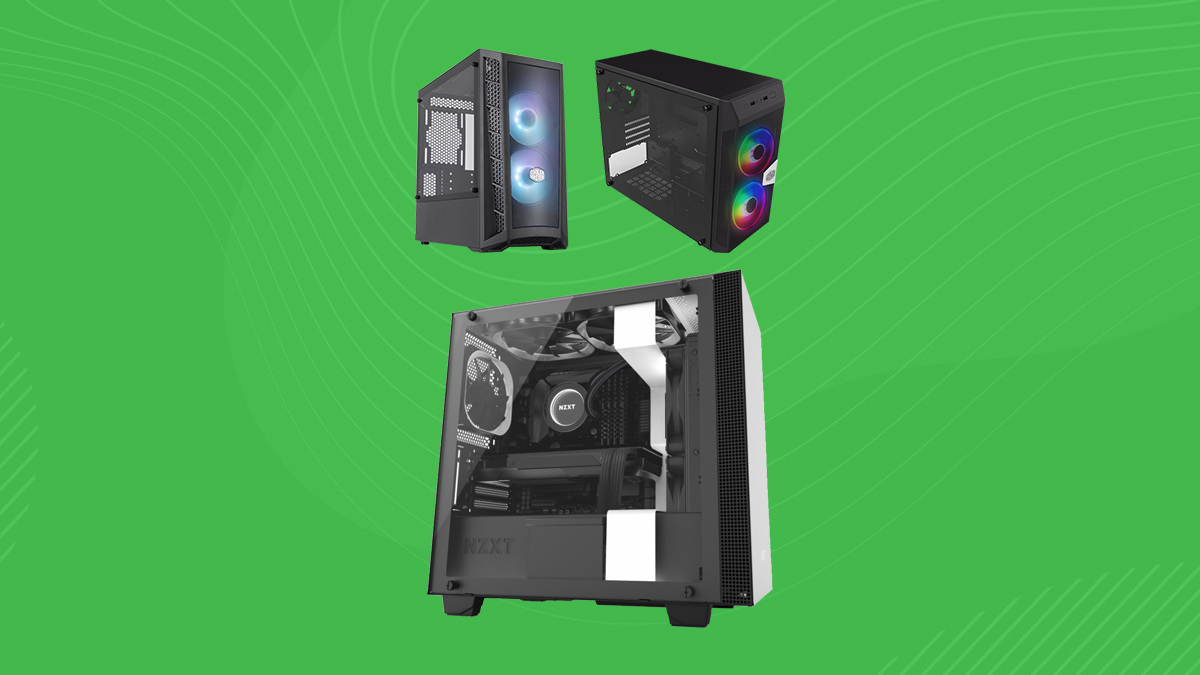
However, selecting a micro ATX case for a compact gaming PC build is not as straightforward as it might seem. The thermal and airflow performance of the case has to be given paramount importance for obvious reasons. Other features such as cable management, drive support, fan and radiator support, front I/O, and aesthetics also have to be considered when making a purchase decision. Finally, the price has to be taken into consideration as well when buying the best micro ATX cases, as it would be unwise to spend hundreds of dollars on a case that provides fewer features than a normal ATX chassis.
The Best Micro ATX Case – Our Recommendations
| # | Preview | Product Name | Award | Details |
|---|---|---|---|---|
| 1 | 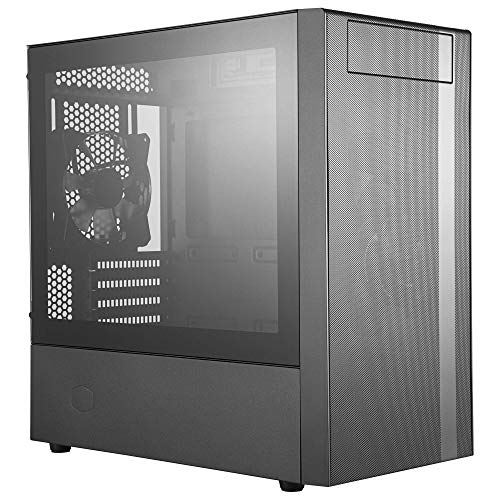 | Cooler Master MasterBox NR400 | Best Overall Micro ATX Case | Check Price |
| 2 | 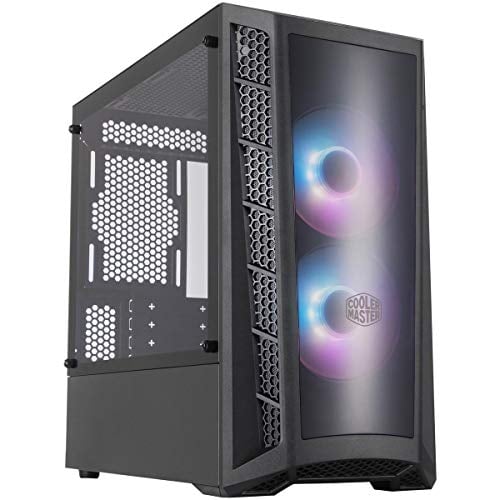 | Cooler Master MasterBox MB320L ARGB | Best Looking Micro ATX Case | Check Price |
| 3 | 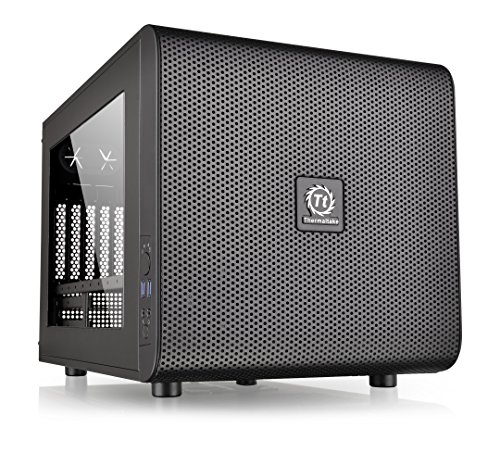 | Thermaltake Core V21 | Most Practical Micro ATX Case | Check Price |
| 4 | 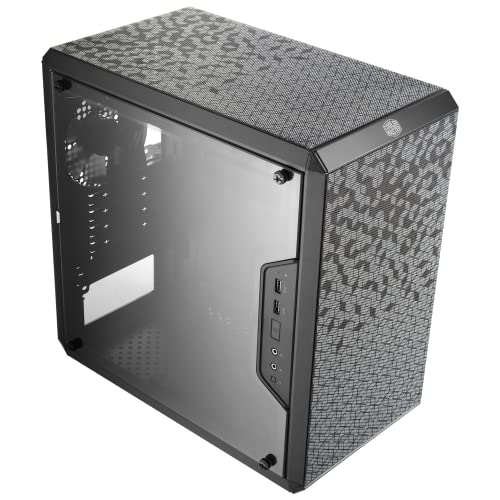 | CoolerMaster MasterBox Q300L | Best Value Micro ATX Case | Check Price |
| 5 | 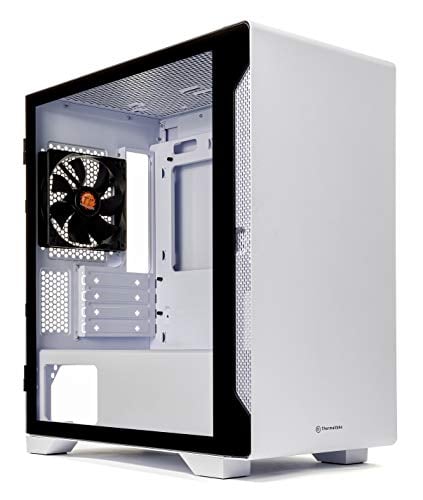 | Thermaltake S100 Snow | Most Unique Micro ATX Case | Check Price |
| # | 1 |
| Preview |  |
| Product Name | Cooler Master MasterBox NR400 |
| Award | Best Overall Micro ATX Case |
| Details | Check Price |
| # | 2 |
| Preview |  |
| Product Name | Cooler Master MasterBox MB320L ARGB |
| Award | Best Looking Micro ATX Case |
| Details | Check Price |
| # | 3 |
| Preview |  |
| Product Name | Thermaltake Core V21 |
| Award | Most Practical Micro ATX Case |
| Details | Check Price |
| # | 4 |
| Preview |  |
| Product Name | CoolerMaster MasterBox Q300L |
| Award | Best Value Micro ATX Case |
| Details | Check Price |
| # | 5 |
| Preview |  |
| Product Name | Thermaltake S100 Snow |
| Award | Most Unique Micro ATX Case |
| Details | Check Price |
Last Update on 2025-07-05 at 11:28 / Affiliate links / Images from Amazon Product Advertising API
Compact PC cases have a lot of quirks and features that potential buyers should keep in mind before making the purchase. These cases also face slight issues in terms of airflow, so don’t expect compact cases to be like the best cases for airflow. However, the positives are also significant as compact cases take up way less space in your setup and are generally cheaper as well. Keeping the factors mentioned above in mind, here are the 5 best micro ATX case options for compact gaming PC builds.
1. Cooler Master MasterBox NR400
Best Overall Micro ATX Case
Form Factor: Micro ATX | Dimensions (W x H x D): 210 mm x 411 mm x 411 mm | Radiator Support: 120mm, 140mm, 240mm, 280mm | Front Panel: 2x USB 3.0, 1x 3.5mm Headset Jack| Motherboard Support: Micro ATX, mini-ITX
Kicking things off is the Cooler Master MasterBox NR400, a micro ATX case that is designed to provide an efficient cooling solution and plenty of features for a high-performance system build. It is marketed as a budget-friendly option for gamers and enthusiasts looking for a compact and functional case.
Aesthetically, the MasterBox NR400 has a sleek and minimalist design, with a brushed metal front panel and a tempered glass side panel that offers a nice view of the internal components. The case has a black color scheme with subtle accents on the front panel and power button. The overall build quality is decent, with a sturdy steel frame that feels solid and durable.
One of the primary features of this case is its supreme airflow. The MasterBox NR400 is designed for efficient cooling, with a mesh front panel that allows for maximum airflow. The case supports up to five fans, with one pre-installed 120mm fan at the front and one 120mm fan at the rear. You may want to purchase additional fans if you want to maximize the performance of your components, or if you prefer RGB lighting.
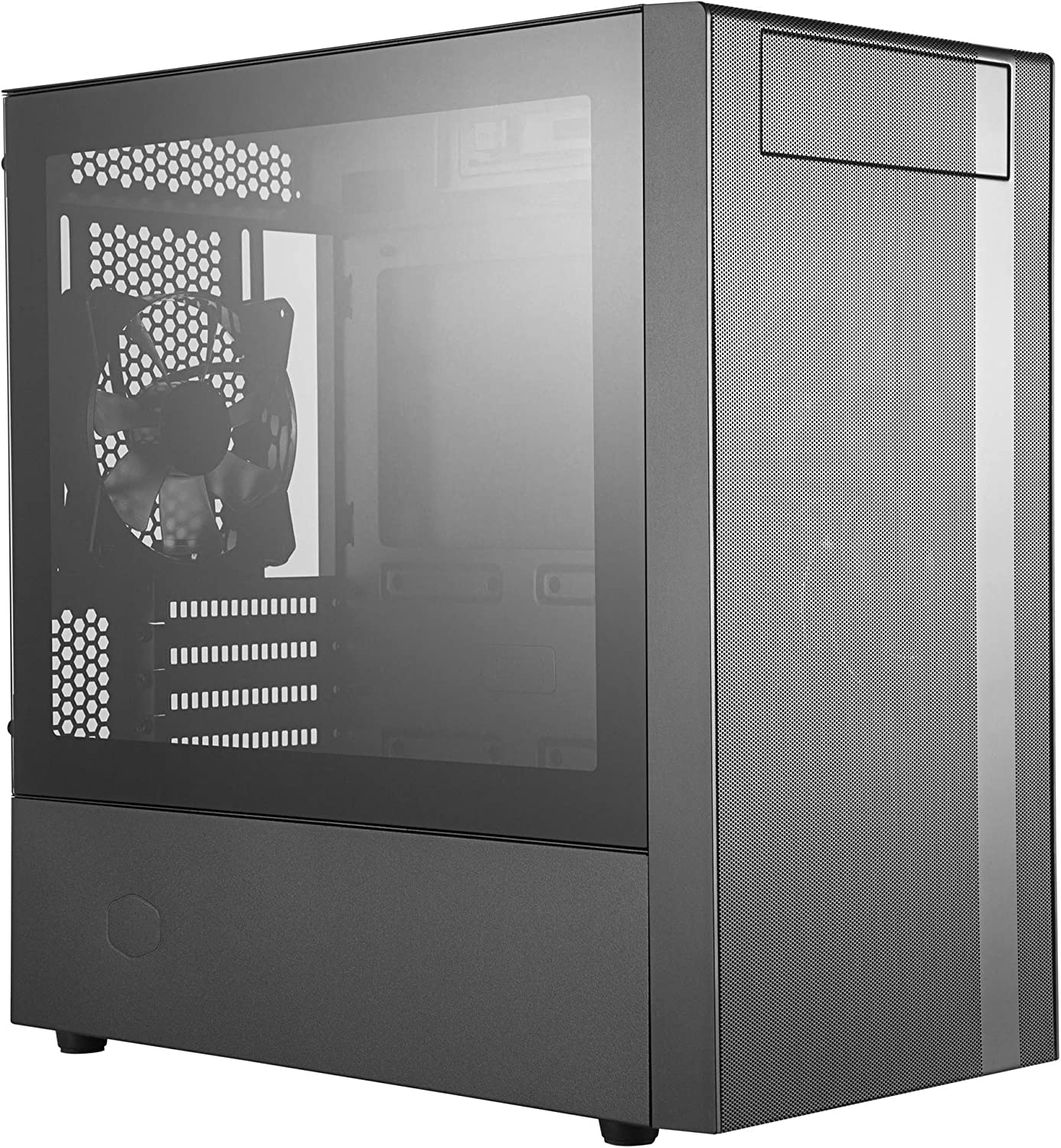
The case also has room for a 280mm radiator at the front and a 120mm radiator at the rear, providing flexibility for liquid cooling options. It may be a little cramped inside if you want to install a liquid cooling loop in this case, but the compatibility is available nonetheless.
In terms of expansion, the case has a spacious interior that can accommodate a variety of components, including up to a 346mm graphics card, a 166mm CPU cooler, and a standard ATX power supply. The NR400 has a cable management system that helps keep cables tidy and out of the way, and a PSU shroud that makes installation and maintenance easier.
Additionally, the case features an optional ODD bay that can be used to install an optical drive. This is a unique feature that is not present in a lot of modern cases. You can also install a hard drive under the ODD mount, and the case provides USB 3.0 on the front panel for easy connectivity.
The MasterBox NR400 is priced rather fairly considering the feature set, making it a budget-friendly option for gamers and enthusiasts on a limited budget. It offers a good balance of features, design, and performance at a reasonable price point. Moreover, it is hard to find airflow-focused cases in this price category.
Overall, the Cooler Master MasterBox NR400 is a solid micro ATX case that offers great value for the price. It has a sleek design, efficient airflow, and ample space for high-performance components. The case’s features make it a compelling option for budget-conscious gamers and enthusiasts looking for a functional and affordable case.
2. Cooler Master MasterBox MB320L ARGB
Best Looking Micro ATX Case
Form Factor: Micro ATX | Dimensions (W x H x D): 217 mm x 410 mm x 435 mm | Radiator Support: 120mm, 140mm, 240mm, 280mm | Front Panel: 2 x USB 3.2 Gen 1, 1 x 3.5mm Audio Jack, 1 x 3.5mm Mic Jack, 1x ARGB/PWM Hub | Motherboard Support: Micro ATX, mini-ITX
Our pick for the best looking micro ATX case is the Cooler Master MasterBox MB320L ARGB, which is a case that features addressable RGB lighting and a sleek design. It is a mid-range, compact option for gamers and enthusiasts who want to add some style and flair to their PC builds.
Looks are the defining feature of this case, and the MasterBox MB320L ARGB has a stylish and modern design, with a smoked front panel and a couple of 120mm ARGB fans pre-installed behind the panel. The front panel has a dark tint to it which is quite unique, and the tempered glass side panel allows you to look at your build in all its glory. The build quality is acceptable, with a sturdy steel frame that feels durable.
Of course, the MasterBox MB320L ARGB is not all about the looks. The case is also designed for optimal airflow, with a pair of large mesh strips on either side of the front panel that allow for decent air intake. The case supports up to five fans, with two pre-installed 120mm fans at the front and one 120mm fan at the rear. The case also has room for a 280mm radiator at the front, providing flexibility for liquid cooling options.
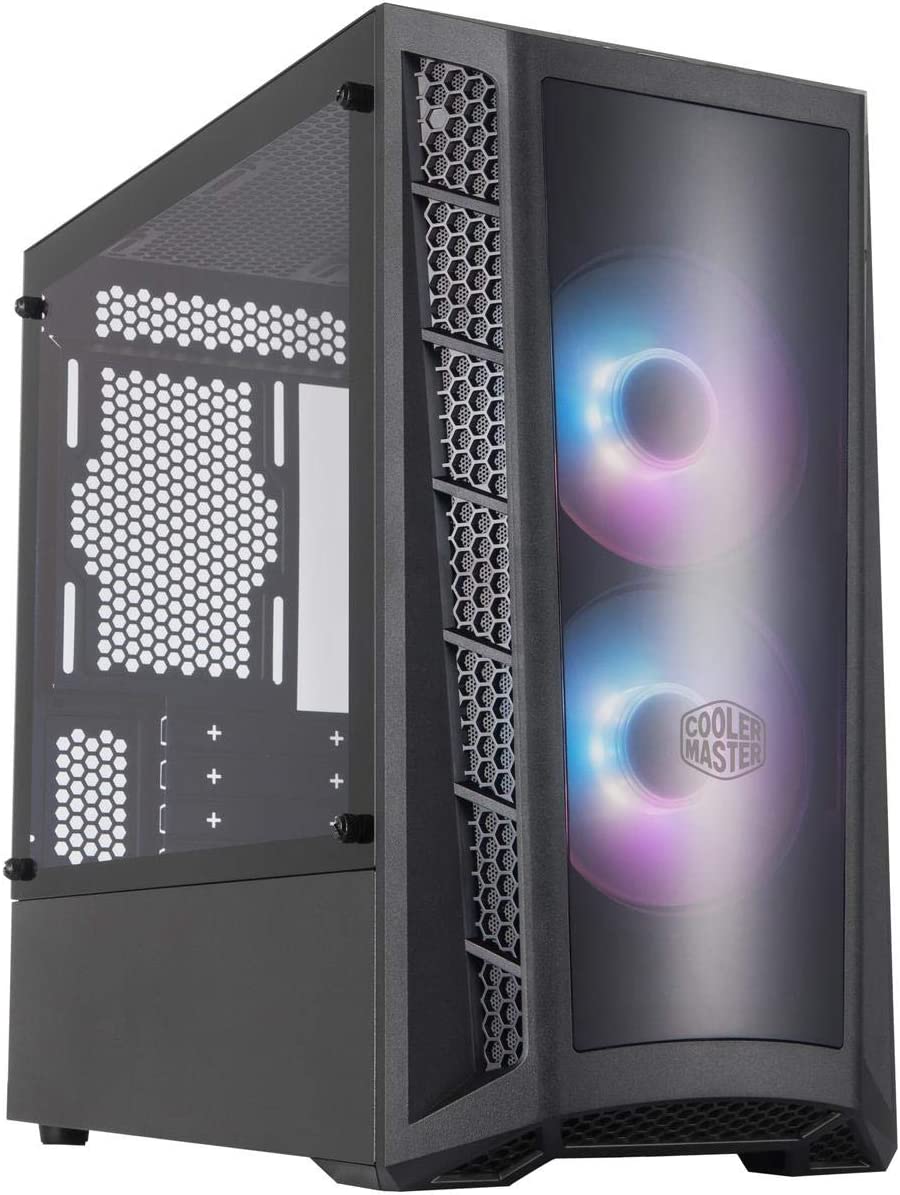
Moreover, the case has a spacious interior that can accommodate a variety of components, including up to a 360mm graphics card, a 159mm CPU cooler, and a standard ATX power supply. Cable management is comfortable and convenient, although the case does not have any rubber grommets to cover the cutouts. The PSU shroud gives the case a clean layout and covers up the excess wiring comfortably.
Obviously the MasterBox MB320L ARGB’s standout feature is its addressable RGB lighting. The front panel ARGB fans can be customized with various lighting effects and colors through the included controller or motherboard software. The case also has an ARGB button on the top panel, adding an extra touch of customization. The lighting is bright and vibrant, adding a dynamic element to the overall aesthetic of the case.
The price of the MasterBox MB320L ARGB is a little higher than competitors with similar features, but the former has the advantage of ARGB lighting that is usually not present in most budget cases. In this price bracket, the MB320L ARGB is a great value for the money, although it can be a bit more expensive than some of the budget offerings on this list.
At the end of the day, the Cooler Master MasterBox MB320L ARGB is a great mATX case that offers a sleek design and vibrant ARGB lighting. It has efficient cooling, ample space for high-performance components, and a variety of customization options. The case’s ARGB lighting and aesthetics make it a compelling option for gamers and enthusiasts looking to add some style and flair to their PC builds.
3. Thermaltake Core V21
Most Practical Micro ATX Case
Pros
- Ample Space Due To Cube Shape
- Horizontal and Vertical Motherboard Mounting Options
- Easy To Work In
- Good Airflow
Cons
- Old-School Design Language
- Build Quality Could Have Been Better
- Cable Management Options Are Unimpressive
Form Factor: Micro ATX | Dimensions (W x H x D): 320 mm x 336 mm x 424 mm | Radiator Support: 120mm, 140mm, 240mm, 280mm | Front Panel: 1 x Audio/Mic, 2 x USB 3.0 | Motherboard Support: Micro ATX, mini-ITX
The Thermaltake Core series is a value-oriented line of cases that aims mainly to maximize the bang-for-the-buck proposition of the buyer. The Core V21 is one such case that stands out from the pack due to its interesting design and practicality. This is a cube-shaped case that supports micro ATX and mini ITX boards, and can thus be used for compact PC builds. The cube shape also makes this one of the best cases for water cooling in the micro ATX form factor.
Despite being a compact case with an unusual design, it still possesses quite a big footprint with the dimensions of 320 mm x 336 mm x 424 mm (W x H x D). This does improve the practicality of the case quite a bit, but it also slightly defeats the purpose of a compact case in the first place. Still, the Core V21 is very easy to work in due to its cube shape and it has some unique features as well. The motherboard can be placed both vertically and horizontally which allows the user to personalize their build in the Core V21. The case also comes with a 200 mm fan at the front which is a nice inclusion by Thermaltake as it provides good airflow.
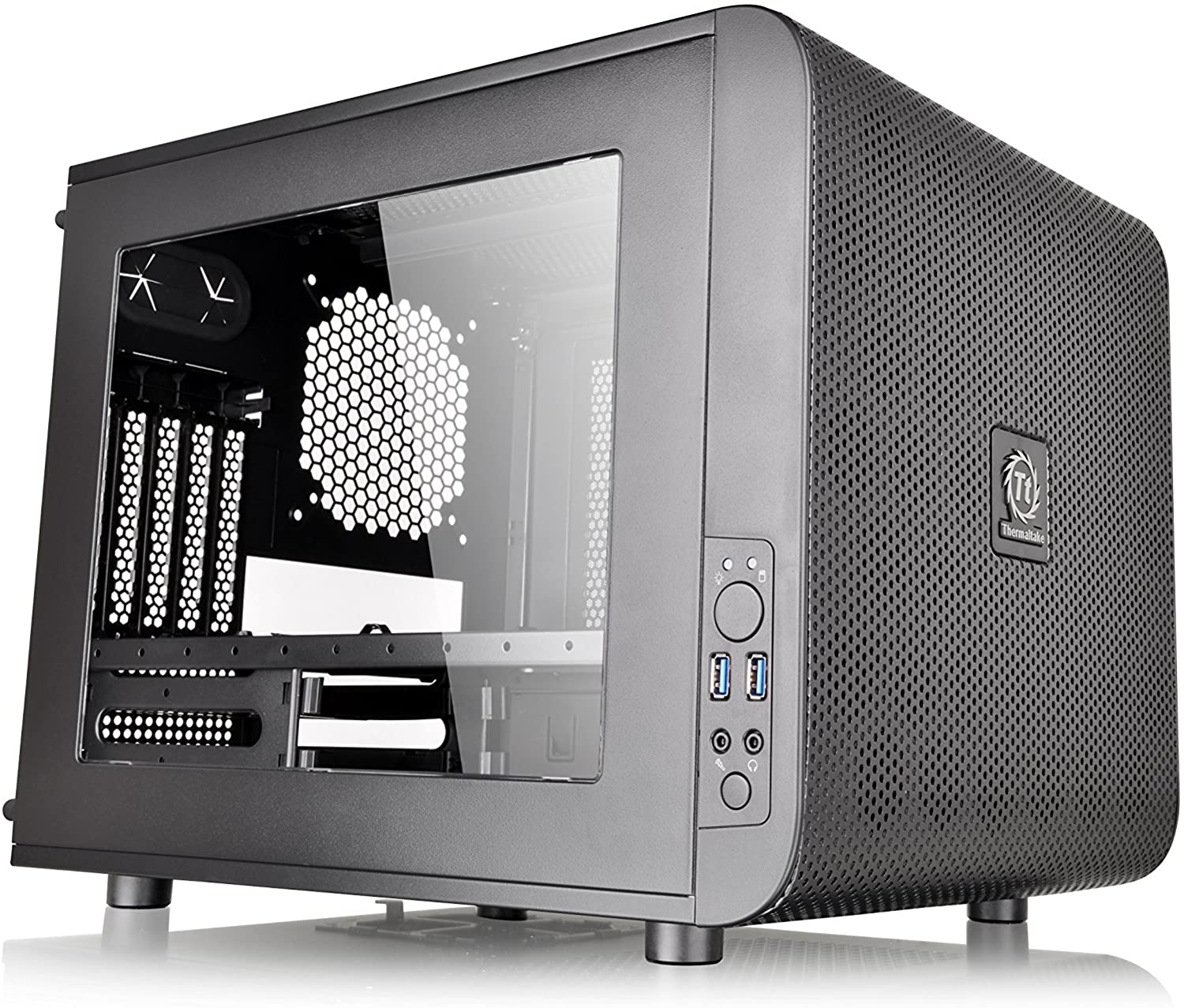
As far as the looks go, this is where the Thermaltake V21 falls a bit flat. The cube-shaped design feels very old-school and outdated, and it cannot match the clean and minimalistic designs that are found on cases today. There is also a lot of negative space inside the chassis, and the lack of a PSU shroud is a glaring oversight that should not have happened considering the design of the case. The side panel of the case is also acrylic rather than tempered glass which gives it a cheap look. Safe to say that Thermaltake has prioritized functionality over looks for the V21.
More PC Cases: Best Dual PC Cases
The Core V21 from Thermaltake is not a bad case at all, in fact, it is one of the more reasonable and practical choices on our list. The cube shape definitely makes it the most practical micro ATX case on our list. It does have good airflow, excellent practicality, and great features which make it a really attractive value, however, the aesthetics of the case leave a lot to be desired.
4. CoolerMaster MasterBox Q300L
Best Value Micro ATX Case
Pros
- Budget Oriented
- Magnetic Dust Filters
- Good Cable Management Space
- Flexible Orientation
Cons
- Poor Airflow
- Unremarkable Build Quality
- No PSU Shroud
Form Factor: Micro ATX | Dimensions (W x H x D): 387 mm x 230 mm x 378 mm | Radiator Support: 120mm, 240mm | Front Panel: 1 x Audio/Mic, 2 x USB 3.0 | Motherboard Support: Micro ATX, mini-ITX
The MasterBox lineup of cases from CoolerMaster is aimed at maximizing the value proposition by providing good quality cases at affordable prices. The MasterBox Q300L is the micro ATX offering from this line that provides just the basics in order to get the job done. This case might just be the best value micro ATX case on our list today. You might also check out our Cooler Master MB511 Review which is a more reasonable ATX case from Cooler Master.
At first glance, the MasterBox Q300L might seem like a barebones case with no-frills, but it does have some good features to offer. The cable management structure of the case is satisfactory and the overall internal layout is also quite convenient. There is plenty of space inside the case to work in easily, and it offers some modularity as well. The case is quite compact but still, it can support a 240mm AiO radiator for cooling, or you can instead increase the substandard airflow by installing more fans in those spots. One big positive point is that full-size dust filters are provided for both the front and the top, which is a nice inclusion.
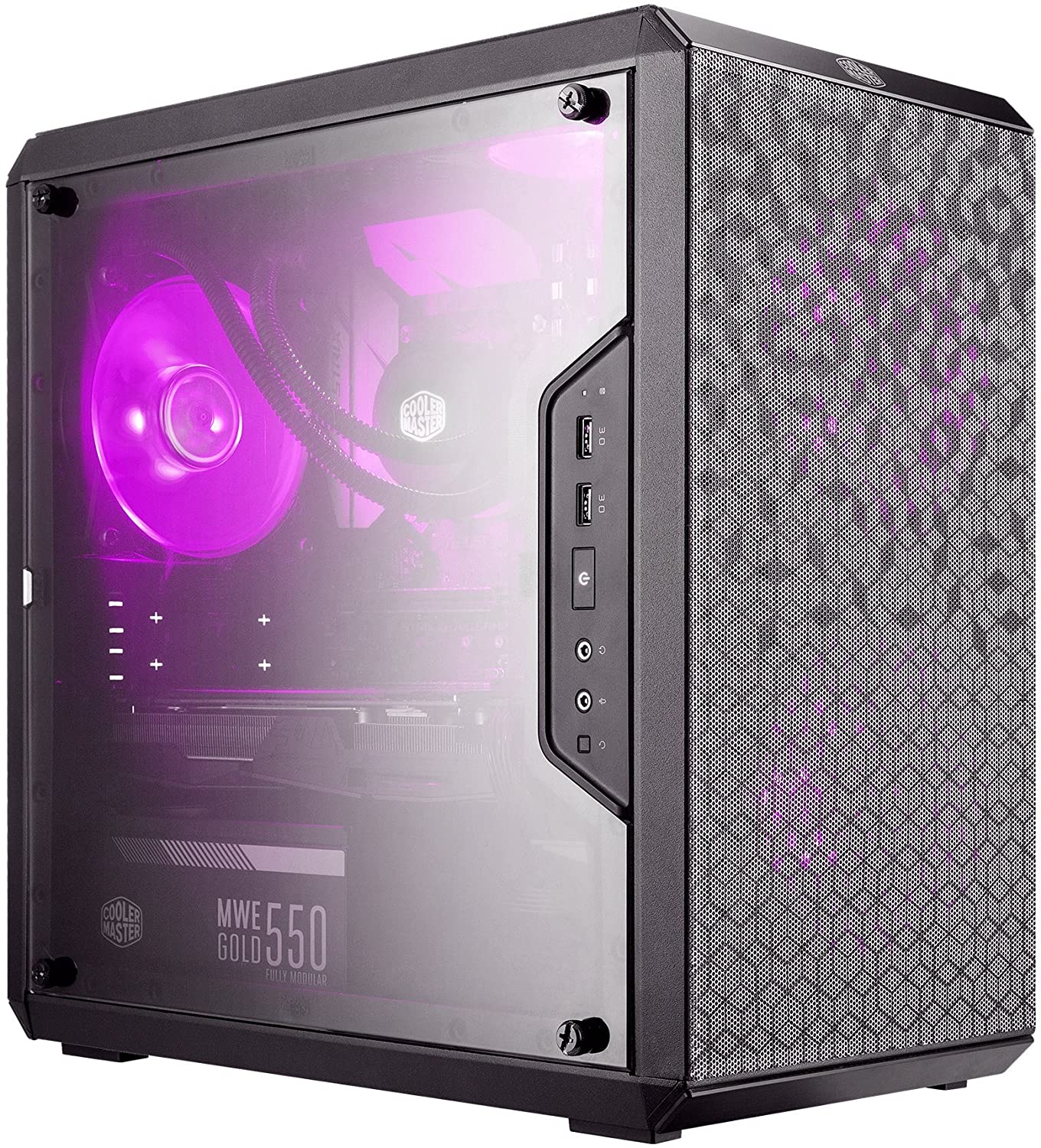
The MasterBox Q300L does not offer anything special as far as aesthetics are concerned. Its overall look is quite basic, and the build quality is also unremarkable in many spots. The side panel has an interesting design because the I/O of the case is located on the left side as well, which gives it a unique look. The panel itself is acrylic and does not hold a candle to the more premium cases in our list, but that is to be expected given the price point. This case can also be counted as one of the best cases under $70 if you are limited to that budget.
All in all, the CoolerMaster MasterBox Q300L is a budget-oriented offering that gets the job done at an affordable price point. Although it may not have the best airflow or the latest features, it is still good enough for a compact, micro ATX build without breaking the bank.
5. Thermaltake S100 Snow
Best White Micro ATX Case
Pros
- Minimalistic Design Language
- Unique White Color
- Dust Filtration
Cons
- Unremarkable Airflow
- Only 1 Included Fan
Form Factor: Micro ATX | Dimensions (W x H x D): 220 mm x 411 mm x 441 mm | Radiator Support: 120mm, 140mm, 240mm, 280mm | Front Panel: 1 x USB 3.0, 2 x USB 2.0, 1 x HD Audio | Motherboard Support: Micro ATX, mini-ITX
If you’re in the market for a micro ATX case that combines style and functionality, look no further than the Thermaltake S100 Snow. This case offers a clean and minimalist design, efficient airflow, and a range of features that make it an excellent choice for PC builders. It is our pick for the best white micro ATX case on the market right now.
Starting with the aesthetics, the Thermaltake S100 Snow has a sleek and modern design, with an all-white steel frame and a tempered glass side panel that provides a nice view of the internal components. The front panel is made of high-quality plastic that gives the case a premium look and feel. The build quality is excellent, and the all-white design gives the case a stylish and elegant appearance.
Efficient airflow is critical for keeping your components cool and running smoothly, and the Thermaltake S100 Snow struggles a bit in that department. The case features a solid panel with a perforated side that allows for limited air intake. In terms of fan support, the S100 can support up to five fans, but it comes with only one included fan at the rear. The case also has room for a 280mm radiator at the front which is a decent option for liquid cooling.
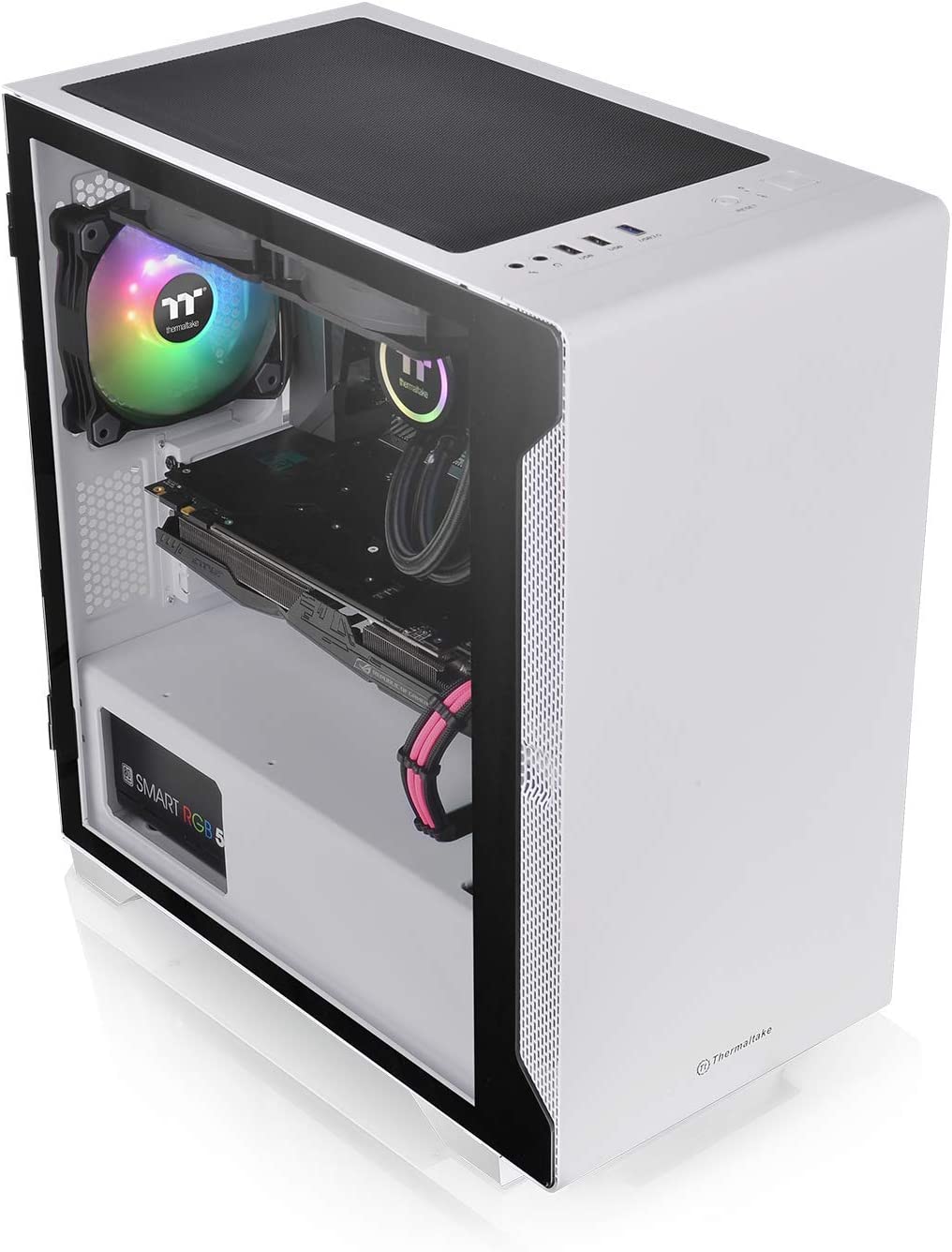
The Thermaltake S100 Snow has a compact and well-organized interior that can accommodate a variety of components, including up to a 330mm graphics card, a 160mm CPU cooler, and a standard ATX power supply. The case has a cable management system that helps keep cables tidy and out of the way, although we would have liked to see some rubber grommets on the cable cutouts.
Moving to the capabilities of the case, the Thermaltake S100 Snow comes with various features that make it an attractive option for micro ATX builds. It has a tool-less design for easy installation and upgrades, a magnetic dust filter at the top and bottom for easy cleaning, and USB 3.0 and USB 2.0 ports on the front panel for easy connectivity. You also get a small cutout at the side of the power supply shroud so you can admire your PSU in all its glory.
In terms of value, the Thermaltake S100 is a really competitive case. It is one of the more affordable options for PC builders who are looking for a stylish and functional micro ATX case. It offers a good balance of features, design, and performance at a reasonable price point. Moreover, it is hard to find a white PC case at this price point that checks all the boxes.
In essence, the Thermaltake S100 Snow is an excellent choice for PC builders who are looking for a clean and minimalist micro ATX case that offers a unique all-white design, a well-organized layout, and a range of features. Its reasonable price point makes it an attractive option for gamers and enthusiasts who want to build a stylish gaming PC, despite its struggles in the airflow department.
Micro ATX Cases vs. Mini-ITX Cases – Comparison
If you are in the market for a compact case of any sort for your new compact PC build, then you might find yourself contemplating between a mini-ITX case and a micro ATX case. Both of these case types are smaller than the typical ATX cases you find in the mid-tower format, but they actually serve slightly different purposes. If you want to choose between a micro ATX case and a mini-ITX case, then you should consider their differences first.
Micro ATX cases, although smaller than standard ATX, are still larger than mini-ITX cases. Furthermore, micro ATX cases are actually cheaper than mini-ITX cases in most instances. This is because mini-ITX cases are specific cases that require a lot of R&D in terms of tooling and manufacturing, so they end up costing more due to their limited volume. Micro ATX cases are also more readily available for the exact same reason. Due to their larger size, micro ATX cases also tend to have better airflow than the smaller mini-ITX cases.
However, on the flip side, the mini-ITX cases are typically much smaller than your average micro ATX case which can play in your favor if you want a really compact build. You would also want to opt for a mini-ITX case if you want a build with some sort of portability factor. For a more in-depth comparison of the two case types, you should definitely check out our guide on micro ATX vs. mini ITX cases. If you finally settled on micro ATX for your build, then be sure to pick one from our selection of the best micro ATX case options in the roundup above.
Frequently Asked Questions
Micro ATX motherboards can be installed in either a full-size ATX case or a compact micro ATX case. Smaller motherboards such as mini-ITX are also supported in both the micro ATX and ATX cases. As a general rule of thumb, smaller size motherboards can be installed in bigger cases but not the other way around.
Generally, micro ATX cases and motherboards are a little bit cheaper than their ATX counterparts. This decrease in price can be attributed to lower manufacturing costs due to fewer raw material requirements. This means that you can save some money by going with a micro ATX setup rather than a standard ATX one. Mini-ITX motherboards, on the other hand, are typically more expensive or on par with ATX motherboards in terms of pricing.
Micro ATX form factor can be as good as ATX when it comes to the airflow but it all depends on the design of the case. Typically, micro ATX cases still have adequate fan mounting options and, therefore, can have great airflow as well. However, some ill-designed micro ATX cases can have terrible airflow due to poor design as well. Mini-ITX cases on the other hand are more challenged in terms of space so it is hard for those cases to have great airflow.
Yes, the micro ATX form factor is worth buying in both motherboards and PC cases. This is because it is typically cheaper than the ATX form factor, but offers more or less the same functionality as ATX. Micro ATX cases are also smaller in size which makes them excellent for compact gaming setups with limited desk space. Micro ATX cases and motherboards usually offer the same feature set as standard ATX options in those categories, so you’re not losing a lot by going with micro ATX instead.
 Check Price
Check Price




